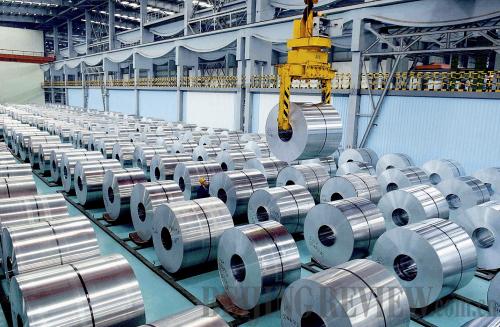|
 |
|
MIXING METALS: This is an alumina processing workshop of Chalco. Aside from its routine alumina production, Chalco is investing heavily in iron ore mining and development around the world (XINHUA) |
China's biggest aluminum producer Aluminum Corp. China Ltd. (Chalco) signed a binding agreement with the world's second largest mining company, Rio Tinto, on July 29 in Beijing. The agreement will establish a joint venture to develop and operate the Simandou iron ore project in Guinea, Africa.
The Simandou project is expected to yield at least 70 million tons of high quality iron ore annually. The resources will be reserved primarily for the Chinese market.
Under the terms of the agreement, Rio Tinto's 95-percent stake in the Simandou project will be held in the new JV. Chalco will acquire a 47-percent stake in the new joint venture by providing $1.35 billion on an earn-in basis through sole funding of ongoing development work over the next two to three years. Once Chalco has paid its $1.35 billion, the effective interests of Rio Tinto and Chalco in the Simandou project will be 50.35 percent and 44.65 percent, respectively. The remaining 5 percent will be held by the International Finance Corp. (IFC), the financing arm of the World Bank, according to Rio Tinto's website.
"Simandou will be the largest integrated iron ore mine and infrastructure project ever developed in Africa," said Rio Tinto's iron ore chief executive Sam Walsh.
Xiong Weiping, Chairman and CEO of Chalco, and President of Chinalco, Chalco's parent company, said the "establishment of a joint venture will make use of Chinalco's advantages in the infrastructure field and its profound understanding of the Chinese market, as well as Rio Tinto's technologies and experience in the operation of large mining projects, to form a complementary and powerful union."
Smooth cooperation
Simandou is a world-class iron ore mining project in the West African nation. Rio Tinto was granted exploration rights to the area in 2006. Exploration results released in 2008 showed that Simandou contained iron ore reserves of up to 2.25 billion tons with a purity of 66 percent.
Since 2006, Rio Tinto has spent more than $650 million on exploration, environmental, community development and evaluation work to develop the project. Current mining, railroad and harbor constructions are expected to create tens of thousands of jobs and will provide 4,000 full time jobs once the mine becomes operational.
On August 2, Rio Tinto said on its website that it has advanced to the next stage of developing the project, approving $170 million in further funding for mine, rail and port infrastructure work on top of the $650 million already spent.
The July 29 agreement follows a memorandum of understanding between Rio Tinto and Chinalco signed earlier in March. Following the formation of the joint venture, Rio Tinto's Simfer subsidiary will continue its supervision over the development of the Simandou project, and Chalco will provide personnel to manage and operate the project.
By now, the joint venture is proceeding smoothly, but its establishment is waiting for the green light from the Guinean Government, and must be in line with Chinese and Guinean supervisory requirements.
But insiders believed the joint venture will not face regulatory obstacles as Guinean, Australian and British government officials were present at the memorandum signing ceremony on July 29.
Making it profitable
For Chalco, the $1.35 billion is only an initial investment. Overall, the Simandou project will require a colossal amount of capital, which Rio Tinto, Chalco and the IFC will provide in proportion with their stakes. Exact figures for required investments from the three are difficult to predict since a timeframe has yet to be set for when the Simandou project will start making money.
Most industry experts agree that real profits from the Simandou project are unlikely, if not impossible, within the next five years. Iron ore exploration is traditionally a long-term investment and Guinea's outdated and inefficient infrastructure is certainly no help—four to five years are needed just to complete a water and electricity supply network, railroad systems and harbors for transporting the iron ore outside the country.
In spite of the lack of short-term benefits, the project will benefit Chalco and the Chinese iron and steel industry in the long run. China is now the biggest importer of iron ore. But iron ore prices are decided by the large iron ore producers, and those producers typically charge the highest prices possible to maximize their profits. Under the deal, iron ore produced in Simandou will first supply the Chinese market, an encouraging turn of events for China's ore-hungry steel mills.
At the July 29 signing ceremony, Xiong said the successful development of the Simandou project will quicken the pace of infrastructure construction and economic development in Guinea, and also efficiently balance China's need for security of supply on the global iron ore market.
Chalco faces other risks aside from profit concerns. The two companies have not reached any agreement on key issues like iron ore sales and transportation. And since the joint venture is a sales company, the question arises: Who should be responsible for mining and distributing profits from iron ore sales? As the memorandum indicates, Rio Tinto's controlling stake puts it in charge of project operations, meaning Rio Tinto has the final say on iron ore pricing. Now, Chalco must seriously consider how it can guarantee its interests in the new company.
| 